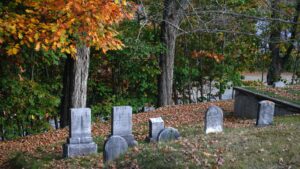
A walk with African ancestors in Newport, Rhode Island
IQ
- 2 Min Read
In order to offer transparency into how our stories are produced and to teach our readers about the importance of media literacy online, the editorial team provides a quick self-rating of the integrity of the articles and the facts presented against the following IQ metrics.
- Published on March 10, 2023
- Last Updated May 15, 2023
- In Culture
African heritage and history can be found in one Common Burial Ground that tells a story of survival in Newport, RI.
On a warm and sunny day, the harbor in Newport, Rhode Island glistens as visitors and people-watchers abound amongthe restaurants, taverns and boutiques at the water’s edge. For nearly 400 years, Newport has welcomed the white shoe wealthy as a summer resort, evidenced by its luxurious Gilded Age mansions and the Newport Casino—now the headquarters of the International Tennis Hall of Fame.
Newport’s Black neighborhoods—found along arteries such as Bellevue Avenue, Levin Street and Memorial Boulevard—define it as much as the mansions such as The Breakers, Rosecliff, Rough Point and Marble House. These areas were home to some remarkable and influential Africans and African Americans. Many of them now rest at God’s Little Acre: the final home of 300 enslaved and free African and African-Americans. A portion of Common Burying Ground, located north of Newport’s waterfront, evokes the African ancestral spirit and provides visitors reflections on America’s complex history.

“The story of God’s Little Acre is a story of survival. It’s a story of identity, the story of power. They saw themselves as Africans,” says Keith Stokes, a ninth generation Newporter and advisor to the Rhode Island Black Heritage Society. Walking through God’s Little Acre, Powers provided a necessary reminder: “The first institutions in America are called African churches, African benevolent societies, African schools. They’re African,” he says. “It’s only later that we become colored and Negro and Black, and that’s just to distance ourselves from our original African identities.”
As surprising as it might be for some to discover such a rich African history in this seaport town, Stokes says: “African heritage in history many times still continues to be interpreted from a white owner class perspective. Slavery is not Black history. Black history is how our ancestors survived and thrived despite slavery. Slavery is how we got here, but it tells you little to who we are as a people.”
In God’s Little Acre, African names “Cuffe,” “Quash” and “Cudjo” are on the markers of those buried there—powerful evidence of African cultural preservation even in New England. Stokes says, “This burying ground here represents a testament of the survivability of African heritage people.”
For a podcast link on God’s Little Acre, click here.


